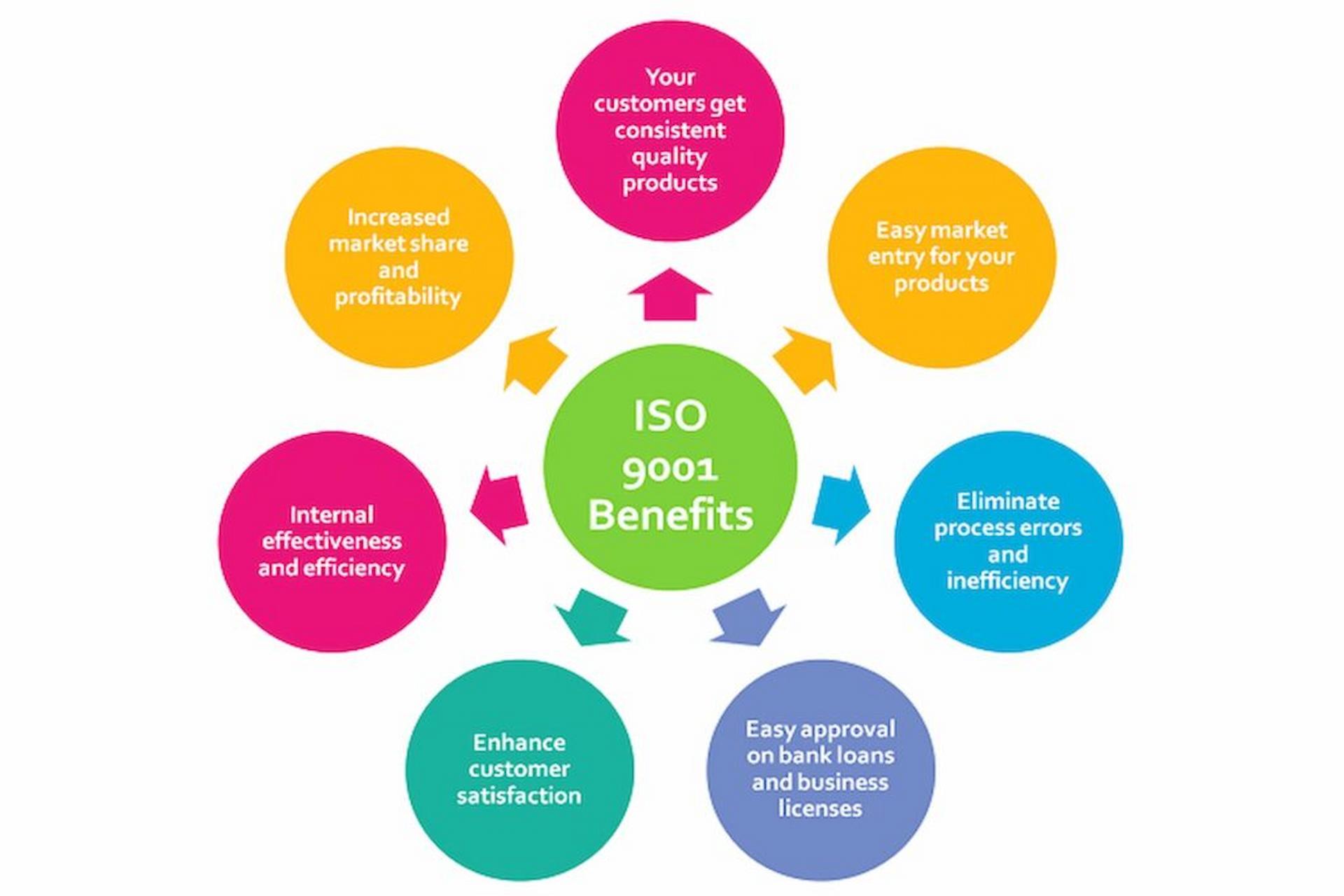ISO 9001 is an internationally-recognised standard that upholds a quality management system (QMS) that demonstrates to customers and stakeholders’ commitment to ensuring all products and services provided are of the highest quality. It is designed to be flexible in nature, allowing a wide range of businesses and organisations to adjust and implement ISO 9001 that reflects their industry sector.
Although achieving this standard is not mandatory for businesses and organisations, the benefits of ISO 9001 can help to:
- Streamline, develop, modernise and improve central processes and procedures.
- Consistently improve and progress operations.
- Reduce overhead costs.
- Increase customer trust and satisfaction.
- Preserve and maintain positive relationships.
- Opportunity to win new business.
- Develop a strong, sustainable business.
Requirements And Benefits Of ISO 9001
There are 7 essential clauses to creating and developing a Quality Management System (QMS) within a business or organisation, achieve consistent, ongoing improvement for ISO 9001 certification.
Clause 1 – Context Of The Organisation
This sets out the purpose of the business or organisation and its strategic direction regarding quality of product and service. It will need to consider:
- Assess the business or organisation’s internal and external factors that impact quality of products or services.
- Identify the business or organisation’s stakeholders, including employees, suppliers and any other parties, such as shareholders.
- Measures the business or organisation adopts to understand their customers and their needs.
Clause 2 – Leadership
The commitment of the business or organisation’s senior management and leadership team in taking responsibility for:
- Creating a comprehensive Quality Management System.
- Establishing quality objectives and policies.
- Communicating the defined quality objectives and policies to employees responsible for their products and services.
- Conducting and managing annual quality management reviews.
Clause 3 – Planning
Businesses and organisations must:
- Document any potential risks including the chance of occurrence and their severity.
- Develop plans to reduce or prevent risks and their effects.
- Integrate and measure effective ISO 9001 plans to improve product and service quality.
Clause 4 – Support
To provide adequate resources to ensure the optimum operation of an effective Quality Management System, including delivering:
- A strong, robust infrastructure.
- Effective and efficient working environments.
- An effective HR management team.
Clause 5 – Operation
Sets out the work the business or organisation needs to adopt to develop and deliver their products or services to customers, including:
- The quality objectives and requirements of the business or organisation’s products or services.
- The processes, procedures, resources and documents needed by employees to produce their products or services successfully.
- The monitoring, testing and inspection required to ensure the ongoing quality of products and services.
- The rules and regulations governing the creation and storage of the business or organisation’s records.
Clause 6 – Performance Evaluation
To measure and analyse the business or organisation’s processes and procedures, including recording and documenting the tasks, to:
- Demonstrate the Quality Management System conforms to the requirements of ISO 9001.
- Ensure all aspects of the QMS are applied.
- Support and ensure continual quality management improvements across the organisation.
Clause 7 – Improvement
To create measures that will ensure continual improvement including:
- The improvement of products or services for the betterment of the business or organisation.
- To strive to better match customer needs and improve customer satisfaction.
- Identify processes and procedures that are not achieving goals, adjust and update them accordingly.
The benefits of ISO 9001 certification for business are many and following the standard’s framework to build an effective Quality Management System will ensure the business or organisation is consistently:
- Identifying their customers and meeting their needs through continuous development of their products or services.
- Reviewing and integrating internal policies and procedures – the QMS documents – and attaining compliance with ISO certification to streamline processes and procedures.
- Improving their image, brand and reputation.
- Establishing a continuous quality improvement culture that is company-wide to consistently produce high quality products or services, as well as the professional development of employees.
- Create partnership opportunities – some companies require ISO 9001 certification to become an accredited supplier.
- Creating a process approach – ensuring processes and procedures are controlled, measured and repeated to produce the desired results and increase operational results.
- Creating a customer focus – establish the aim of the business or organisation to ensure customers are satisfied and happy through the process and procedure steps for improvement.
- Increase revenue, improve operations and reduce costs
- Improve employee job satisfaction and morale.
Working towards ISO accreditation can be time consuming but once achieved, the benefits of ISO 9001 certification can bring the rewards.
If you would like to know more about the services we can provide, then contact JR Consultants today by calling 01268 758000 or emailing info@jrconsultants.co.uk to set up an initial conversation with the team.


